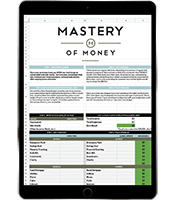Once upon a time, you walked into your bank as a new customer. More likely than not, you were given One Checking Account, One Savings Account, a Debit Card, made your initial deposits into the accounts, and left the bank.
Seemed just fine at the time, right? You used the Checking Account for your Direct Deposit and to pay bills and spend money. You used the Savings Account to set aside money that wasn’t meant to be spent or used for bills, perhaps as a solid “Emergency Fund” for yourself (because you may have heard that term through the personal-finance-grapevine or from a friend).
Time has come and gone since then.
Today, you are most likely paying more Bills now than ever before in your life. You’re probably making more money than ever before, and, if you’re like many Americans, you’re also spending more money on your lifestyle as your income has increased.
The old cliché of “keeping up with the Jones’” may resonate now more than ever. Take a second to actually ask yourself this question: How are you feeling as you look to your peers who may be traveling on fancy vacations with their brand-new cell phones taking pictures while dining at five-star restaurants? Has it affected how you make your own money decisions?
For many young professionals, the pressure “to have it all” can be a very real presence in their day-to-day lives. They’re “supposed to” be saving for the future while also paying back loans and having some resemblance of a social life. How are we supposed to balance this as life gets even more complicated around us?
The Sand Challenge
It’s like if I asked you to go to your favorite beach – with a special challenge. The challenge is to pick up a handful of sand… and carry as much as you can all the way back to your home. Good luck! You’ll arrive at your door with a whole lot less sand in your hand than you first picked up. It fell through the cracks didn’t it?
I must ask you this important question: what if the same thing is happening to money in your financial world – and you haven’t even realized it?
Presenting: “The Golden Rule of Bank Accounts”
What is the Golden Rule? No, not the one that says “treat other people the way that you want to be treated” – though that is an excellent rule!
The Golden Rule of Bank Accounts is very simply put – Each Bank Account Can Only Have ONE Purpose.
Not two. Not three. Not zero.
Each Bank Account should have a “nickname.” Let’s examine this closer with a few examples.
The “BILLS” Checking Account a.k.a. “BIGGIE”
This should be a checking account that, you guessed it, pays your bills. Not just ‘some’ of your bills, but rather it pays ‘all’ of your bills.
Bills include any and all…
-Automatic payments (often student loan payments, car payments, insurance payments, etc.)
-Online payments (often utility bills, cell phone bills, etc.)
-Checks that you write (could be for your rent to landlord, or roommates for split bills, etc.)
Your stress level is directly related to the balance in this account. Just imagine the balance goes down to just two hundred dollars during the month – you’d be panicking! “When is my next check coming in? When is the next bill due? How much is it for?” That can be super stressful!
Instead, this account should ideally have a ‘buffer’ in the balance which will make you feel much more confident. I jokingly call this account Biggie because you want this account to be as ‘buffered’ as the late-great-Notorious B.I.G.
For example, if you pay $1,500 in total per month in Bill Payments, you may consider having this account ‘buffered’ to a low of 2 times your monthly bills amount and up to 3 times your monthly bills amount. Imagine if you paid $1,500 per month in bills, but your BILLS Checking Account always has between $3,000 – $4,500 as a balance throughout the month. You’d know that you have the money to pay your bills for the next couple months already!
The “SPENDING” Checking Account a.k.a. “FOR SWIPES”
Imagine the same account that you use to pay for your BILLS is also the same account that you use when you go out with your friends for dinner and drinks. Couldn’t you envision the possibility of you going a bit too crazy on going out and having it interfere with your bills getting paid? Yikes!
Spending out of your BILLS Account leads to overspending, dipping into savings, building credit card debt, and other bad financial consequences. Millions are stuck banging their head against the wall with frustration.
Instead, SPENDING should be a completely separate checking account at the same bank as your BILLS Checking Account. The Bills Account receives your Direct Deposit and all income that you earn; it is ‘buffered’ and pays all of your bills. Following “The Golden Rule,” the purpose of SPENDING is different than the purpose of BILLS.
By evaluating how much money comes in each month and what you MUST do first (save and pay bills) then you can figure out how much money is left over for spending. For example, imagine that after setting aside 20% of your net pay, and paying all your bills, you find that you make enough money to easily spend $300 per week. Set up the automatic transfer for $300/week from BILLS to SPENDING, which allows you to spend that money on all the swipes, online shopping, and ATM Cash Withdrawals – completely guilt-free! This isn’t just “fun money” because swiping for groceries and gas for your car may not seem like fun, but this is the account that you use for all swipes!
If you only spend $250 one week of your $300 that was transferred, then that $50 rolls over into the next week by just staying in your Spending Account. That money will be getting another $300 added to it when you get your next automatic weekly transfer.
The “Emergency Fund” Savings Account a.k.a. “MC HAMMER”
Why is this account called MC Hammer? Because just like his famous song, the money that goes into this account, you must tell yourself… “Can’t Touch This!” (Bonus points for you if you yelled “Stop! Hammertime!”) I’ve had other clients call this the “Oh Shit!” Fund because that’s what they say to themselves if they have to tap into it.
The purpose of this account is to have money set aside in the event of an emergency – for example, losing your job and going for a while without a paycheck. Despite what Dave Ramsey may preach about saving just $1,000 and then tackling your debt super aggressively, I highly suggest saving up much more to this account – closer to between 3 to 6 times your monthly bills amount is a much safer range for Americans to build up in cash reserves.
Ideally, your “Emergency Fund” Savings Account is a High-Yield Savings account, like the ones offered by www.Ally.com or www.Marcus.com, which have no minimum balance, no monthly fees, and as of mid-2019 are paying over 2.00% APY. These accounts back in 2006 were paying over 5.00% APY. Sending money from the BILLS Checking Account to the EMERGENCY FUND Savings Account doesn’t cost you anything, and it allows you to have control over building wealth and managing your savings rate.
The “Down Payment” Savings Account
If you are currently renting and have the goal of becoming a homeowner, this should be a separate savings account from your Emergency Fund. Money that goes into this account from your BILLS account is specifically earmarked for the use for your Down Payment. Look to my other article for the 10 things to do before buying a home.
The “Travel / Gifts” Savings Account
How many of you have felt overwhelmed when having to pay for Wedding Gifts, Bachelor/ette Parties, and all the costs of wedding season? Flights and Hotels and AirBnb – oh my! These expenses can throw off your monthly obligations of paying bills and saving money, but they do not have to! Setting aside a weekly or monthly sum from BILLS to TRAVEL/GIFTS allows you to be prepared for these expenses. Even just $50/week adds up to over $2,500 per year!
The “Tax” Savings Account – #1099Life
If you’re working for yourself, or if you have any income that is 1099 as opposed to W-2, that means that you have to set aside state and federal income taxes by yourself. If you don’t set aside the money right away when you earn it, it’ll be a rude awakening for you come mid-April during Tax Season. Even many six-figure earners still can never get caught up with taxes, and they end up paying fees and interest to the IRS because they never organized their bank accounts like this.
I suggest have your BILLS and SPENDING Checking Accounts at one bank, ideally a brick-and-mortar branch that you can walk into, get quarters, and ask questions in person – and all of your Savings Accounts like the Emergency Fund, Down Payment, and Travel Fund, be at a second bank, such as an online bank. No matter what, you should NOT be paying any monthly fees on any of your checking or savings accounts.
What is the answer to the question of how many accounts you should have? The answer is at least 2 checking accounts, one for BILLS and one for SPENDING. You should also have a few savings accounts, one nicknamed Emergency Fund, and others for the savings goals most important to you specifically, like real estate for example. This system has helped thousands of Americans of all backgrounds, income levels, and occupations to live their lives with more financial confidence by being in control of their Cash Flow more efficiently than ever. By following “The Golden Rule of Bank Accounts” you can make sure you’re not letting any hard-earned money fall through your fingers.




